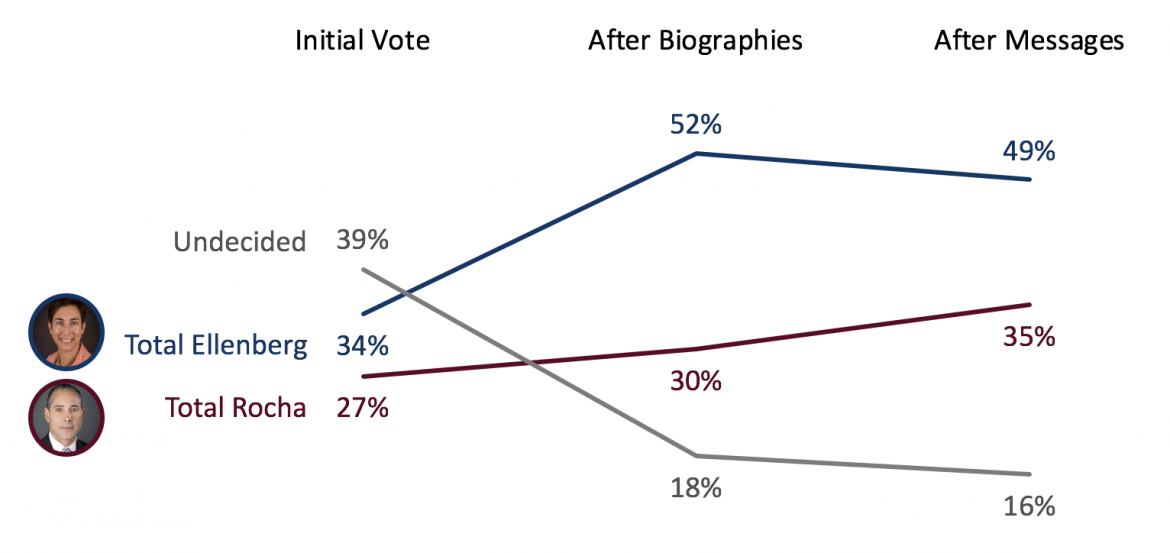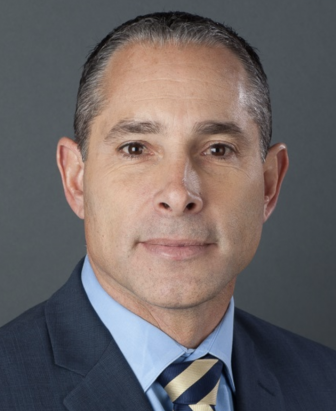The race to succeed Santa Clara County Supervisor Ken Yeager pits a first-term trustee of the South Bay’s largest school district against a two-term representative of Silicon Valley’s largest city. Whoever wins next month will preside over a $7 billion annual budget at an agency that employs 20,000 people and serves 1.9 million constituents.
San Jose Unified trustee Susan Ellenberg, 52, and San Jose Councilman Don Rocha, 50, hope to become the critical swing vote on a five-member board that has long held a labor-friendly majority. There’s a massive workload cut out for the winning candidate: sweeping jail reforms, ambitious legal challenges to the Trump administration, the upcoming decennial census and social services to meet the needs of people marginalized by a growing wealth gap, inequities in law enforcement and discrimination based on gender, sexual orientation, nationality and residency status.
Both candidates, who’ve each raised about $200,000 to date, stand left-of-center on core issues and hold split endorsements from Yeager and progressive groups, including the Bay Area Municipal Elections Committee, the Santa Clara County Democratic Party and the Sierra Club Loma Prieta Chapter. Policy-wise, they diverge only slightly when it comes to prioritizing county resources should they win the District 4 seat, which represents San Jose’s Cambrian, Rose Garden and Willow Glen neighborhoods as well as the cities of Campbell and Santa Clara and unincorporated Burbank.
In a poll paid for by an independent expenditure committee co-founded by Ellenberg supporter and Silicon Valley Leadership Group CEO Carl Guardino, his preferred candidate’s messaging put her ahead of Rocha.
The survey conducted over five days in late August found that the D4 hopefuls had similar levels of initial favorability (Ellenberg, 34 percent; Rocha, 29 percent), which veered in Ellenberg’s favor once respondents heard biographical descriptions from each candidate’s campaign website (Ellenberg, 52 percent; Rocha, 30 percent).

Source: FM3 Research
For voters torn between two progressive candidates, however, identity could be the deciding factor in an election cycle widely considered to be a “year of the woman.” The Mercury News article on Monday suggested that gender may influence the outcome of the race, especially since their June primary challenger Dominic Caserta withdrew his candidacy in the primary in response to sexual assault allegations.
With just a couple weeks to go until the Nov. 6 election, here’s a refresher on where the D4 candidates stand on the issues based Q&As, forums, media interviews, op-eds and campaign websites, and how they plan to govern if elected to the Board of Supervisors.
Don Rocha
 A lifelong South Bay resident who graduated from San Diego State University with a degree in political science, Don Rocha has worked in public service for the better part of two decades. After six years at the city’s now-defunct Redevelopment Agency, the father of three went on to serve on the Cambrian School District governing board before his election to the City Council in 2010.
A lifelong South Bay resident who graduated from San Diego State University with a degree in political science, Don Rocha has worked in public service for the better part of two decades. After six years at the city’s now-defunct Redevelopment Agency, the father of three went on to serve on the Cambrian School District governing board before his election to the City Council in 2010.
Rocha said he decided to run for supervisor to strengthen services for the region’s most vulnerable residents and to tackle housing affordability, homelessness, traffic, growth and public safety.
“It’s the work that I’ve been doing at the city council, so it really affords me to continue the work that I’ve already done and even expand it on a greater scale at the county,” he said in a recent Valley Politics interview sponsored by the Santa Clara County League of Women Voters.
In a SVLG questionnaire, Rocha also cited health care coverage as one of his most pressing concerns. “After the passage of the Affordable Care Act, we have made progress in reducing the number of uninsured residents in Santa Clara County,” he replied. “It’s critical that we maintain and build upon these gains, even in the face of threats to the ACA at the federal level.”
Throughout this campaign season, Rocha has stressed the importance of taking “a regional approach” to address these issues. One way he plans to do this is by reviving a countywide committee made up of officials from various local jurisdictions to tackle housing and transit.
Partnerships are key within county government, too, he said. The Sheriff’s Office, which has faced unprecedented scrutiny since the 2015 murder of mentally ill inmate Michael Tyree by three jail guards, is in the process of launching an office of independent law enforcement oversight.
“This isn’t just about incarceration, this is about programs and diversions,” he told CreaTV’s Valley Politics host Terry Christensen in the televised forum earlier this month. “So everybody has to be at the table. I wouldn’t suggest that one person lead—everybody should be a partner.”
Rocha has repeatedly commended the county for its well-managed network of public parks and called the Valley Health Care System a “crown jewel” of local government. He applauded the current Board of Supervisors for getting Measure A, a $950 million affordable housing bond, across the goal line in 2016.
Priority number one as a board member, he said, would be to make sure Measure A dollars are spent “effectively and efficiently, but also in the right place.”
“I want to be at the table on that particular issue,” he told Christensen in the CreaTV interview. “And then the homeless—to me, they go hand in hand. I think a significant amount of the population on the homeless side is a result of the housing affordability issue here. So hopefully working on those two issues from different angles will make a dent in this tragic housing crisis we have here.”
Rocha has said he plans to follow Yeager’s lead as part of the majority bloc comprising supervisor Cindy Chavez and Dave Cortese. Though Rocha is considered the union-aligned candidate and enjoys support from the South Bay Labor Council, he has proven his independence by reaching across the aisle on certain issues. For example, Rocha notes in his SVLG Q&A that he went against labor’s wishes in 2012 by supporting a controversial pension reform measure passed by voters as Measure B, which he said he later realized was a mistake and worked to remedy it.
And while critical of Google’s potential to displace low-income San Jose residents with its move to downtown, Rocha agrees with Ellenberg that the company’s move would be a net positive for a city that holds itself out to be the Capital of Silicon Valley.
Susan Ellenberg
 A Pittsburgh, Pennsylvania, native who graduated from Barnard College before earning her law degree at Columbia University, Susan Ellenberg found success as an attorney but said she felt a calling for community service that would one day lead her to elected office.
A Pittsburgh, Pennsylvania, native who graduated from Barnard College before earning her law degree at Columbia University, Susan Ellenberg found success as an attorney but said she felt a calling for community service that would one day lead her to elected office.
Ellenberg, a social justice teacher at Yavneh Day School, became deeply involved in the San Jose Unified School District while her three kids were still in elementary school. In 2014, with her youngest daughter a freshman at Lincoln High, she took the plunge and ran for the district’s Area 2 seat.
Her work in the ensuing years inspired her to eye the supervisor seat because so many of the issues at the school district overlapped with those at the county, which led her to volunteer as a jail monitor and a member of the Santa Clara County Commission on the Status of Women.
“One of the primary concerns that I’ve had as a school board member has been the partnership with school-linked services,” she told Christensen at the Valley Politics forum. “County government is in a position to support our students by providing mental and behavioral health care, access to dental services, well-child checkups as well as a wide variety of learning supplements.”
Regional crises of homelessness and affordability had a direct impact on the families she served in SJUSD, Ellenberg explained.
“It’s what I have seen as school board member in terms of the number of students we have who are unstably housed, who have inadequate access to nutrition, healthcare, no early childhood educational opportunities—a whole litany of challenges that we can’t address at the school board level, those are all the levers that are at the county,” she said. “I believe that strong partnerships between county government and schools will improve student performance, which will lead to a better-prepared workforce.”
Ellenberg said she would like to see the county to ramp up services for the neediest residents and bolster oversight of its troubled jails.
In an op-ed earlier this summer, Ellenberg said she believes the board of supes also needs to make better use of county owned land like the Old City Hall Annex, which was briefly considered as a potential site for short-term homeless housing.
“I think the county needs to set the example,” she reiterated in her Valley Politics interview. “We’ve got the Measure A dollars, which give us tremendous leverage.”
The county should figure out how to make the most out of its biggest properties, too, Ellenberg said, including the fairgrounds and the Reid-Hillview Airport.
Should she win the D4 seat, Ellenberg said her top priority would be to address the root causes of homelessness using a four-pronged approach. That is, to build permanent supportive housing as quickly as possible, expand mental and behavioral health services, ensure that folks coming out of the criminal justice system land on their feet and to improve outcomes for young adults aging out of foster care.
“That’s a real touch point for likely homelessness as well: kids that are transitioning out of the foster care system,” Ellenberg told Christensen. “Looking at all four of those in connection to homelessness is crucial.”
Like Rocha, she said she supports statewide measures that would generate billions of dollars in revenue for below-market-rate housing and mental health services. But, unlike her rival, she opposes Prop. 10, which would overturn Costa Hawkins, a law that limits rent control to units built after 1996 and, in San Jose, after 1979.
In terms of political allegiances, Ellenberg has said on several occasions that she believes she’d work well with Supervisor Joe Simitian, who often votes in step with his colleague Mike Wasserman, but that her record speaks to her independence.
For example, Ellenberg worked for the Silicon Valley Organization (SVO), one of the region’s leading business advocacy groups, but left during the primary on less-than-amicable terms and without its endorsement. While backed by a host of business-aligned leaders, including San Jose Mayor Sam Liccardo and SVLG CEO Carl Guardino, who’s been raising money through an independent expenditure committee to boost her chances Nov. 6, Ellenberg has also garnered support from labor-loyal figures such as former Congressman Mike Honda and ex-Assemblywoman Nora Campos and from unions such as the San Jose Teachers Association and the Registered Nurses Professional Association.


ellberg is an out of touch east coast elite…go back to the hamptons
How can Susan Ellenberg justify her candidacy for a higher position in Government when she leads a school system that produces poor academic results for students with only 6% of English Learners meeting math standards on the state test in 2017. While overall student performance is low, the academic performance of key subgroups like students of color, English Learners, Economically Disadvantaged, and students with disability is even lower generating huge achievement gaps. See more at http://sipbigpicture.com.
It is an inconvenient truth that the primary mission of SJUSD should be academic achievement for ALL students. The district is not there yet! As leader of the organization, Susan should take some responsibility, buckle down, and fix the system. After she demonstrates accomplishment in this arena, she can move on to the next big show!
Until then, she should stick with her day job!
Glad to see someone basing their criticism on actual metrics and facts. But in my opinion, many of the issues that plague public CA schools are much larger than individual districts and boards. Even a perfect school board is not going to have the resources to fix the achievement gaps you are describing. So I’ll gladly judge Ellenberg based on her school board record, but I want more details — has Ellenberg been a responsive and responsible board member? Had she made rational choices that have enhanced the lives of her constituents? Has she worked well with her colleagues while still displaying a capacity for independence?
I’m inclined to vote against Don Rocha based on how he has gotten along with his council colleagues and treated his political opponents. I remember one story of him skipping a council meeting but tossing around a football on the 18th floor just to make a point about how he was available to attend but choosing not to.
I appreciate your perspective Aw Jeez especially your take on the petulant Don Rocha. I disagree with your contention that it is beyond the scope of our school district to address low student academic performance and the achievement gap. As a leader of the organization, Susan should be demanding that her superintendent and administration begin to act more like an accountable system rather than an eclectic, raconteur organization that does not have good quality control on what goes on in classrooms across the district.
This would mean that she should advance a systems approach to teaching and learning. She should be able to differentiate ends and means. She should demand clear and easy to understand student academic outcomes and hold the administration responsible for achieveing these goals. She should demand that the district adopt high quality curricual, system wide aligned professional practices, and quality assessments. These solutions do not have to be invented in house. A representative from the International Baccaluareate made a presentation at MetroEd early this week and not one administrator was in attendance. The IB is a high quality and well recognized system for improving curricula, professional practices, and assessments. Why were there no representatives from SJUSD at this very important and informative meeting?
Once a system is in place, she should demand comprehensive montioring, evaluation, and accountability. She should demand that the system be implemented in a scientific way using research from Dean Fixsen and others on how best to implement initiatives. She should demand regular data-rich presentations on the successful implementation of curricula and professional practices as well as student outcomes. She needs to celebrate successes and make sure that there are real consequences for failure to implement well.
Our children and families deserve this. We are definitely not operating as a world-class organization but we should. No?
Thank you for this high-effort reply. You clearly know what you’re talking about and have made me question the standards that I hold school boards accountable to.
How can Susan Ellenberg justify her candidacy for a higher governmental position when she leads a school system that produces poor academic results for its students? Only 3% of English Learners met math standards on the state test in 2017. Overall student performance in Math and ELA is low but the academic performance of key subgroups like students of color, economically disadvantaged, English Learners, and students with disability is even lower. You can review the poor results at http://sipbigpicture.com.
It is an inconvenient truth that the primary mission of SJUSD is the academic achievement of all students within the system. The district is not there yet. As a leader of this organization, Susan should take some responsibility for student academic performance. Susan should buckle down, and work to fix the system by refocusing the district on the academic achievement of its students; work to improve professional practices at all levels, and also improve assessments. She should demand tha the administration produce clear and easily interpretible system-wide professional practices data as well as student outcome data that includes growth data.
After she can demonstrate leadership in turning around this chaotic system, she can move on to the next big show in government. Until then, she should stick with her day job.
100% agree!
How can Susan Ellenberg justify her candidacy for a higher governmental position when she leads a school system that produces poor academic results for its students? Only 3% of 11th grade English Learners met math standards on the state test in 2017. Overall student performance in Math and ELA is low but the academic performance of key subgroups like students of color, economically disadvantaged, English Learners, and students with disability is even lower. You can review the poor results at http://sipbigpicture.com.
It is an inconvenient truth that the primary mission of SJUSD is the academic achievement of all students within the system. The district is not there yet. As a leader of this organization, Susan should take some responsibility for student academic performance. Susan should buckle down, and work to fix the system by refocusing the district on the academic achievement of its students; work to improve professional practices at all levels, and also improve assessments. She should demand tha the administration produce clear and easily interpretible system-wide professional practices data as well as student outcome data that includes growth data.
After she can demonstrate leadership in turning around this chaotic system, she can move on to the next big show in government. Until then, she should stick with her day job.
School district trustees and the CTA are responsible for California being among the lowest achievers in the entire US, despite having the highest expenditures for education. Money alone does not buy results. The poor collective record of every school district in the state, and the CTA, which is spending millions to stop charter schools are responsible for the growth in demand for charter schools by parents who cannot afford private schools. If California teachers collectively did their jobs properly, there would be no demand for charter schools.I will never again vote for any person seeking a public office who has been a school trustee or is backed by the CTA.
The K-12 system is chaotic and dysfunctional and Teacher Union and Shmoozer Trustees play a key role in adding to the fog of education. Look at SJUSD. The administration has givenn up its role in leading a school district out of a crisis in student academic achievement by entering the Real Estate Business trying to build housing for teachers.
You also need to include district administration in your critque as well as they establish the conditions that require teachers to unionize and build iron-clad contracts as they become fodder for miscreant administrators who want to have only young teachers on their staff and will move to fire veteran teachers in order to save money. Administrators will often place novice teachers in the most challenging teaching positions. So while you attribute the dysfunction in SJUSD to unions, please also consider the role of administrators and milquetoast trustees who represent the root cause of the Teacher Union pathology.
Nancy Albrarran failed to send anyone to an amazing demonstration and program presented within the MetroEd Disrrict called the International Baccalaureate that would go a long way to addressing the endemic weaknesses in the SJUSD system. She has answers to her crisis in her backyard that she ignores.
In order to improve this chaotic system, there needs to be a refocus on student academic outcomes; acquisition or development of high quality curricula; commitment to aligned professional practices of teachers, principals, and district administrators; quality asessements. We also need a district administration who understand how to implement initiatives across the district using the precepts of the science of implementation. We also need a strong monitoring/evalustion accountability system that includes easy to understand student outcome and professional practices data.
Other school districts have done it. Why can’t we?
> Look at SJUSD. The administration has givenn up its role in leading a school district out of a crisis in student academic achievement by entering the Real Estate Business trying to build housing for teachers.
Yes!
And the public — at least in Almaden Valley — IS OUTRAGED!
The clowns can’t run a school system, and the enrollment is declining, so they want to wheel and deal in real estate, housing policy, income redistribution, and solving the homeless problem.
I have been urging people to get every candidate for SJUSD Trustee ON RECORD regarding whether or not they support the zany, stupid, dishonest, deceptive, and unfair teacher housing scheme.
So far candidates have been spouting platitudes about “studying the issue” and “listening to all points of view”. But the gossip is that all the current members of the board AND the candidates support it.
This is what causes revolutions.
It truly does boggle one’s mind that a school district administration can wander so far from its core mission and work to delve into an area where they have even less expertise! There is a crisis in academic achievement within SJUSD. It is time that the SJUSD School Board and administration face these brutal facts and begin planning and acting appropriately to adress this major problem!
Doctors who are facing a tragedy of multiple people in their emergency room needing expert care are not all of the sudden going to begin considering how best to ensure that the nurses on staff have adequate housing. It is ludicrous. They recognize their rolse, stay in their lanes, and help the patients under their care. SJUSD Board and Administration should come to the same realization.
It is not the job of the school district to find housing for teachers even in good times. Maybe they could pay their teachers better salaries in a trade for improved professional practices, full year’s worth of work, and a full 9-5 day’s worth of work. Not unreasonable. And while they are at it, District administration should be spending 90% of their time in schools and classrooms modelling high quality lessons that highlight quality professional practices and use of the curriculum. They should become instructional leaders and not just educational schmoozers!